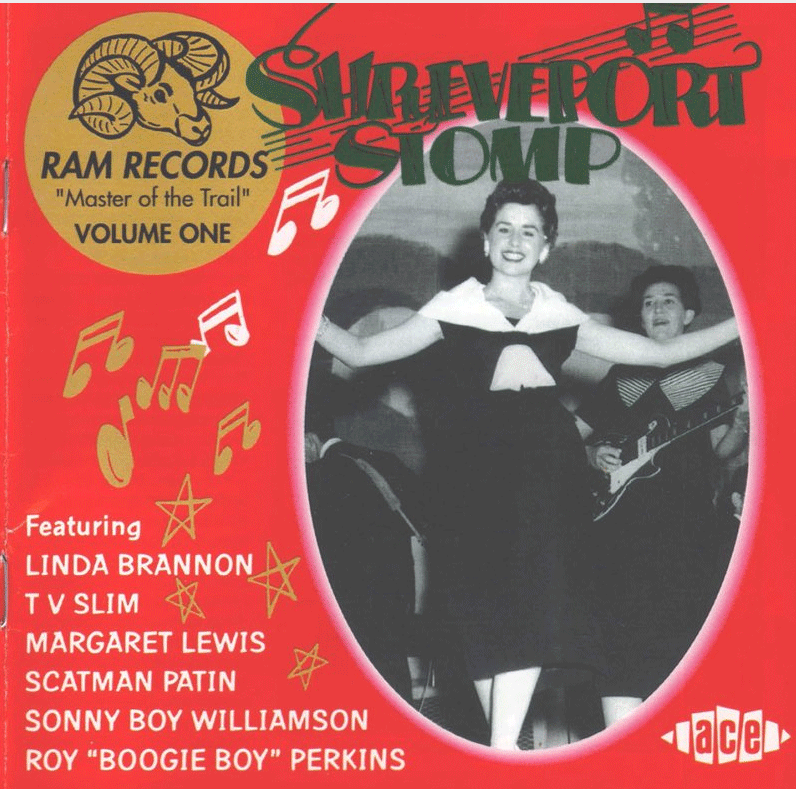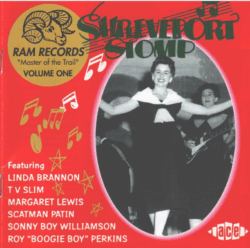Pressing Vinyl and Shattering Glass
The female-run record company that changed the soundscape of 1950s Shreveport
Published: December 1, 2024
Last Updated: February 28, 2025

The album insert for “Shreveport Stomp,” produced by RAM Records.
In 1955, the Louisiana Hayride was booming. The radio and television show had just launched a new star by the name of Elvis Presley, who was doing very nicely, and the other country-and-western artists it broadcast over the airwaves were getting noticed. There was an opportunity there for local and regional performers to build on that buzz and make some money, if they had product to sell. But Shreveport, whose downtown Municipal Auditorium was the show’s home base, had no real recording facility. So Mira Ann Smith, a twenty-nine-year-old guitarist, songwriter, and Hayride fan originally from Alexandria, decided she would take care of that herself. For good measure, she also started a record label: Royal Audio Music, or RAM Records.
Mira played guitar, wrote songs, mixed sessions, and collected discarded egg cartons to make a sound baffle at the RAM studio, which she enlisted friends and relatives to help her build out DIY-style, on Lakeshore Drive in Shreveport. Soon, she had clients and artists for her label, including Dale Hawkins, Roy “Boogie Boy” Perkins, a teenage James Burton, and herself, under the name Grace Tennessee.
The heyday of independent record labels in America stretched roughly from the 1940s to the early 1960s. The marketplace was a scrappy Wild West that in many ways had a low barrier to entry, since it was a brand-new industry; there was no establishment to break into. A lot of early “record men” were first- or second-generation immigrants from modest backgrounds. One of the era’s acknowledged greats was Joe Bihari of Modern Records, the son of Hungarian Jewish immigrants who spent most of his childhood in the Jewish Children’s Home in New Orleans, deposited there with a sister by parents who had six other children and not enough resources to cover everyone.
“This was a diverse breed, certainly, that scouted, recorded, manufactured, recorded, published, sold and (they hoped) collected at the same time,” writes John Broven in his sweeping history Record Makers and Breakers. “The record makers worked all hours because they had to, mostly on shoestring budgets with a barrage of external factors to overcome.”
Being female was an extra external factor to overcome, but there were probably more record women out in this fray than you’d think. Estelle Axton co-founded Stax Records with her brother Jim Stewart; the story of Florence Greenberg and her labels Tiara and Scepter became the basis for a 2011 Broadway jukebox musical. Vivian Carter was the Vee of Chicago’s Vee-Jay, Devora Brown ran Fortune in Detroit and Lillian McMurry started her influential blues label Trumpet Records in a corner of her husband’s furniture store in Jackson, Mississippi. In New Orleans, Connie LaRocca started Frisco Records in 1962.
It was never stated as part of RAM’s explicit mission, but Mira and her label did a significant amount of work with other women. Guitarist Margaret (Maggie) Lewis, a regular cast member on the Louisiana Hayride starting in 1958, became Mira’s writing partner, and together they penned songs for Jeannie C. Riley; June Bug Bailey, a fifteen-year-old who worked at the barbecue joint down the street; and country singer Linda Brannon, whose recording “Wherever You Are” was so popular RAM had to lease it to Chess Records to keep up with the distribution demand.
Mira loved studio work. In a 2002 interview with country-music scholar Tracey E. W. Laird, Maggie Lewis recalled, “Mira thought Les Paul was the end—she just loved him. And when the Les Paul guitar came out, oh, she had to have it . . . It was a pioneer time and Mira was very much a pioneer in recording because she just loved it so much and was just fascinated by all of the sounds that you could get by going in and experimenting with these different instruments.”
RAM had two subsidiaries during its run, Clif Records and K Records. (The latter was named for her sister Katherine and is a neat historical Easter egg for fans of riot grrrl: the other K Records, founded in Olympia, Washington, in the 1980s, was an important breeding ground for that indie feminist punk movement.)
The Louisiana Hayride ended its regular broadcasts in 1960, and the local music business suffered for it. Smith closed the studio and moved to Nashville with Lewis, working as songwriters and producers; their clients included Shelby Singleton, a Mercury Records executive who’d grown up in Shreveport. Likely the most well-known song they co-wrote for his publishing company was the plaintive country-soul ballad “Reconsider Me,” a top ten R&B hit in 1969. Both women racked up professional honors, including BMI performance awards and induction into the Southern Songwriters Hall of Fame. They moved back to Shreveport in 1981, when Lewis married Smith’s cousin Alton Warwick, who’d done the carpentry work building out the RAM studio. The couple became major civic boosters on the Shreveport cultural scene and also partners in the RAM label, licensing its songs to projects like, most recently, the Oscar-winning film Green Book.
Mira Smith died of leukemia in 1989, at sixty-four. In 1995 she was the inaugural inductee into the Billboard Women in Music Hall of Fame. Maggie Lewis Warwick represented her at the ceremony in Nashville.
Maggie Lewis Warwick passed away in 2019. When her husband appeared on Shreveport podcast All Y’all to memorialize her, he noted the impact of his cousin’s work too. “Girl singers were just supposed to sing,” said Alton. “They weren’t supposed to make waves, they weren’t supposed to produce records. They were not supposed to lead the band. But her and Mira, they were not going to go quietly into the night. So, in Nashville and all of those places, they made a mark in a man’s world.”
A columnist since 2016, Alison Fensterstock has written for 64 Parishes about music, dogs, witches, hippies, and other things.

Listen Up is funded in part by a grant from the New Orleans Jazz & Heritage Foundation.
